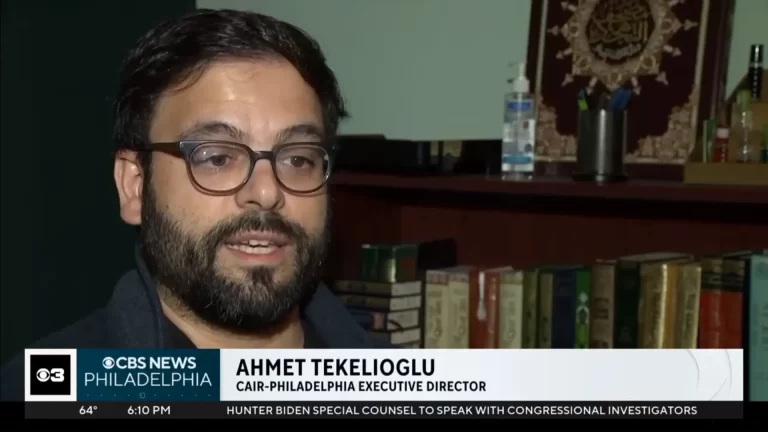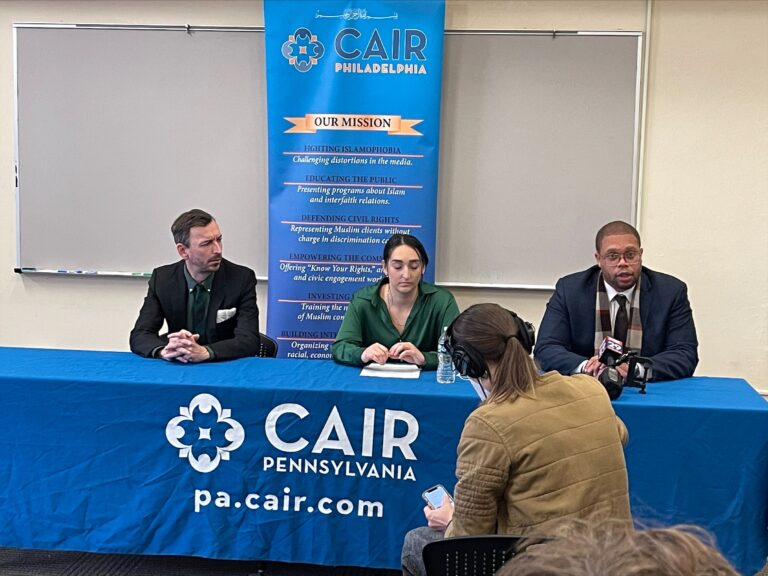by Kathryn Pyle
PhilanTopic Blog (Philanthropy News Digest)
“Muslim Americans feel so muted today, drowned out by the hysteria in the mainstream media,” lamented Moein Khawaja, director of the Philadelphia chapter of the Council on American-Islamic Relations (CAIR), at a special iftar, or meal breaking the Ramadan fast, last week. “We’re only about six million people in the U.S., and for the past nine years we’ve been on the defensive. We have to be proactive and produce our own media that’s more representative of our experiences: media that’s more positive; that shows the multitude of Islamic voices.”
Just such an opportunity has been created in Philadelphia, thanks in part to a planning grant from the Pew Center for Arts & Heritage and an intern secured through the Samuel S. Fels Fund‘s annual summer program linking graduate students with community groups. Muslim Voices of Philadelphia, launched at that recent iftar, is a collaborative media project hosted by the Scribe Video Center, a nonprofit organization that works with individuals and groups without know-how or means to tell their stories in video, radio, and new media. The project will produce ten videos over the next two years, with participants from local Muslim organizations shaping the aims and content, learning the necessary skills, and actually making the films.
While the Muslim Voices project may be its newest activity, Scribe boasts a 27-year history of building media capacity among minority communities. The center offers a roster of classes, open to everyone, and also works with selected projects proposed and implemented by community groups. In the latter case, Scribe provides the training, equipment, and advisors needed to shepherd the projects from idea to screening. Hundreds of videos have been created over the years, recording a variety of places and programs and, just as importantly, capturing the memories and spirit embodied in neighborhoods, buildings, and public spaces: from an animation-enhanced hip-hop music-ed short about a bicycle shop in West Philadelphia that teaches local kids how to repair bikes to more traditional documentaries about a cemetery, a community garden, a swim club, and everything in between. The aim is to help organizations produce media for their own archives, educational purposes, and/or for broadcast via public television, community cable channels, and public screenings at traditional venues and outdoor events.
“Muslims have been part of several video programs in recent years,” said Scribe director Louis Massiah, who is co-leading the project with Haverford College professor Maris Gillette. “One example is the New Africa Center, represented at the iftar; they participated in Scribe’s Precious Places program a few years ago. Precious Places celebrates Philadelphia’s rich history from the bottom up. Through Muslim Voices of Philadelphia, we’re hoping for a collection of films that represent the diversity of that particular community.”
Located in the heart of West Philadelphia, the New Africa Center/Muslim American Museum & Archive is the creation of the Islamic Cultural Preservation and Information Council, a coalition of scholars, educators, artists, and families that organizes exhibits about African-American Muslims and supports the surrounding Muslim community with seminars, educational programs, and family activities. The center has also worked with the Philadelphia school district and the Pennsylvania Department of Education to conduct teacher training and classroom presentations on Islamic culture. The video produced through Precious Places — filming of which is captured in the photo above — was aired on local public television station WHYY in 2008 and has been used in ongoing educational programs.
Muslim Voices got off the ground thanks in part to research by Ayesha Butt, a Fels intern and Ph.D. candidate in religion. Several online databases helped her locate contemporary Islamic centers, mosques, businesses, and restaurants, and the search continued by word of mouth once key contacts were made. Ayesha’s research revealed that by the late 1800s, Muslim immigrants from Africa, the Middle East, Eastern Europe, Asia, and the Caribbean had settled in the region. Successive waves of newcomers mirrored the immigration patterns of other groups, with the area’s Muslim population expanding significantly following World War II and again over the past two decades. “There are now fifty-one Islamic centers here,” she told the audience at the Scribe event, which attracted about seventy people representing various groups; the iftar was part of the outreach for the project.
The project, still being defined in collaboration with the community, will connect archival research, ethnography, oral history, and digital media. Each individual film project will be supported by a filmmaker advisor and scholar, said Gillette, an anthropologist and expert on China whose early work with the Hui, a Muslim population in northwest China, stimulated her interest in Muslim culture. “I think most of the groups want to document the history of their organizations — mosques, advocacy groups, and social networks. People from some of the African-American masjids (mosques) also indicated an interest in exploring how Islam figured in their struggles for civil rights, so I think that could be a theme. We’re looking forward to working with the organizations who’ve already expressed interest and hoping to reach out to even more groups over the coming months.”
The project received a planning and development grant from the Pew Center’s Heritage Philadelphia Program. According to program director Bill Adair, “The proposal review panel that selected Muslim Voices for funding was intrigued by the potential to bring together the various communities within the community bound by the Islamic faith.” The panel met last spring, before the current provocations directed against Muslims, but, as noted by Adair, with the understanding that Muslims have faced increasing discrimination since 9/11. “We’re all tremendously excited about this initiative,” he said. “There’s no better illustration of our priority: projects that unveil hidden histories that, in their telling, inform the present.”
In a recent post for PhilanTopic, Michael Seltzer described Lower Manhattan as a “neighborhood of conscience” and located the Islamic community center and mosque proposed for the neighborhood in the context of nearby groups that work to recognize and promote dialogue and a “culture of human rights.” Muslim Voices of Philadelphia promises to extend that neighborhood to the City of Brotherly Love.





